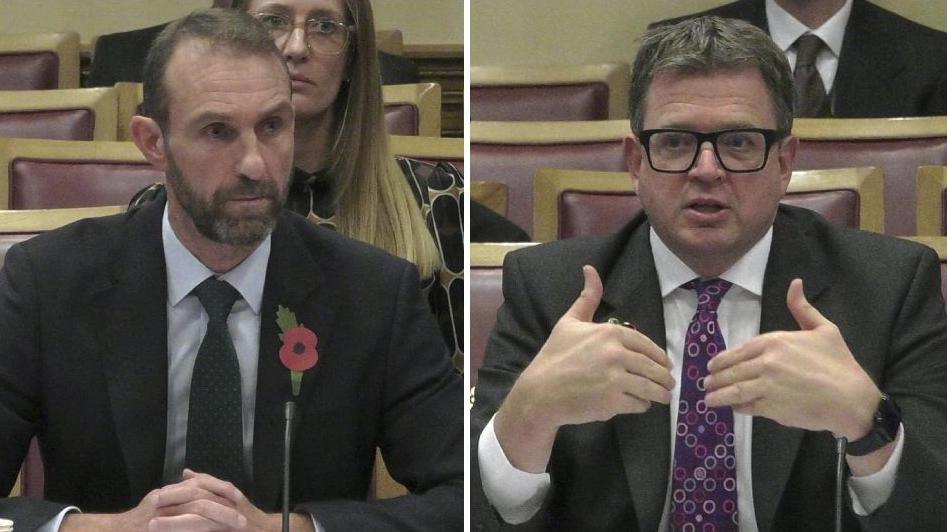Key figures at odds over collapse of China spy case

Matt Collins and Tom Little KC gave evidence at the National Security Strategy Committee, made up of MPs and members of the House of Lords
- Published
Key figures involved in the failed criminal case against two men accused of spying for China have given conflicting accounts to a parliamentary committee about why the case collapsed.
In September, prosecutors dropped charges against Christopher Cash and Christopher Berry, who had been charged under the Official Secrets Act. Both men deny wrongdoing.
The director of public prosecutions, Stephen Parkinson, had said the case could not progress because the government's deputy national security adviser, Matt Collins, was unwilling to classify China as an active threat to national security.
However, Mr Collins told the committee he had been given legal advice that his evidence would be "enough".
He said he always knew the case would be "a challenge" but that he had been "trying to ensure that we could support a successful prosecution".
Mr Collins - who was set to be the government's witness in the trial - added: "And so I was somewhat surprised when I was told on 3 September that the intention was to drop the case."
In contrast Tom Little KC - who would have been the lead prosecuting barrister in the case - said he would be "surprised" if Mr Collins had not realised the prosecution would collapse unless he offered further evidence.
Earlier in the session, Mr Little had said Mr Collins had been clear he would not say that "China posed an active threat to national security at the material time".
"That was in answer to what I regard as the million dollar question in the case, and once he had said that the current prosecution for those charges was effectively unsustainable," he added.
He said the case was brought to "a crashing halt" when Mr Collins outlined the limits of what he would be wiling to say in court.
Asked by the National Security Strategy Committee about the evidence he provided to prosecutors, Mr Collins said: "What I was able to say is that China poses a range of threats to our national security.
"I was able to say that these include espionage threats, cyber threats, threats to our democratic institutions, threats to our economic security.
"I would be able to say that these threats are very real and persistent, and the operational partners are dealing with them on a daily basis."
He added he believed the CPS was asking him to "use the generic term that China is a threat, or China is an active threat, which is not in line with government policy at the time".
Members of the committee pressed Mr Parkinson and Mr Little on why they felt Mr Collins had not provided enough evidence that China could be considered a threat.
Labour peer Lord Paul Boateng noted that, in his evidence Mr Collins had said "China's espionage operations threaten the UK's economic prosperity and resilience, and the integrity of our democratic institutions".
He argued the phrase would be enough to indicate "we are dealing with an enemy".
Lord Mark Sedwill, a former national security adviser, suggested that if Mr Collins was only able to reflect the government view, the prosecution could have sought other witnesses who could have characterised China as a "threat to national security".
However, Mr Little said the limits of Mr Collins' evidence would have derailed the case, regardless of what others said.
Labour MP Dame Emily Thornberry asked why prosecutors could not have trusted a jury to conclude China could be deemed a threat.
Mr Parkinson argued that, without the key evidence from Mr Collins, a judge would not have let the case go to trial.
Mr Collins submitted his first witness statement in December 2023, after which prosecutors decided they had enough evidence to charge Mr Cash and Mr Berry under the Official Secrets Act 1911.
However, Mr Parkinson said a ruling in a separate court case in 2024 changed the requirements of what evidence would be needed and so prosecutors asked Mr Collins to provide further witness statements, in the hope he would label China a "threat to national security".
In two further statements, Mr Collins detailed threats posed by China in cyberspace and to the UK's democratic institutions but avoided labelling the country "a threat to national security".
The collapse of the case triggered a political row over who was to blame. The Conservatives have accused the Labour government of allowing the case to fail because it wanted to foster better relations with Beijing.
However, the government said ministers had no role in providing evidence for the case and Mr Collins was giving evidence based on what Conservative government policy had been at the time.
On Wednesday, the committee will hear evidence from Attorney General Lord Hermer and senior minister Darren Jones.
Who is giving evidence on the collapsed China spy trial?
- Published3 days ago
The controversy over the collapsed China spy case explained
- Published16 October
Key China spy case witness removed 'enemy' from evidence under Tories
- Published3 days ago